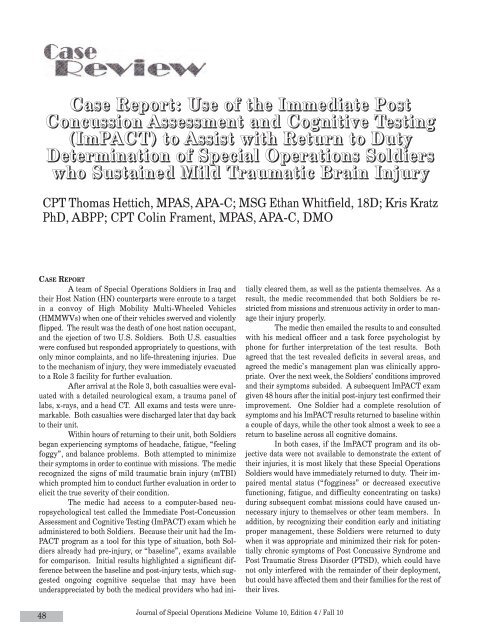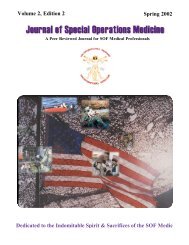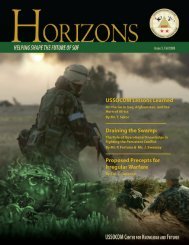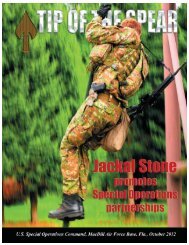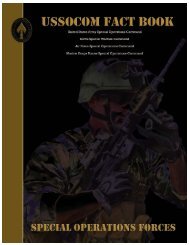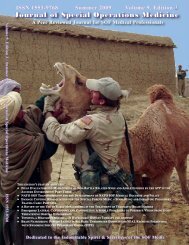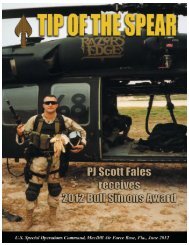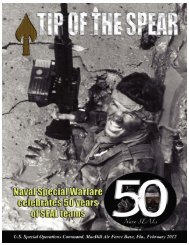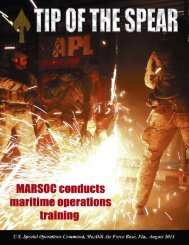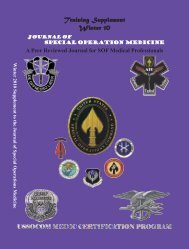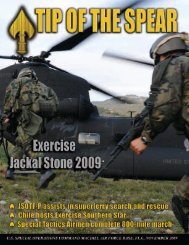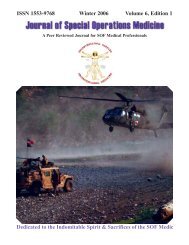Fall - United States Special Operations Command
Fall - United States Special Operations Command
Fall - United States Special Operations Command
You also want an ePaper? Increase the reach of your titles
YUMPU automatically turns print PDFs into web optimized ePapers that Google loves.
48<br />
Case Report: Use of the Immediate Post<br />
Concussion Assessment and Cognitive Testing<br />
(ImPACT) to Assist with Return to Duty<br />
Determination of <strong>Special</strong> <strong>Operations</strong> Soldiers<br />
who Sustained Mild Traumatic Brain Injury<br />
CPT Thomas Hettich, MPAS, APA-C; MSG Ethan Whitfield, 18D; Kris Kratz<br />
PhD, ABPP; CPT Colin Frament, MPAS, APA-C, DMO<br />
CASE REPORT<br />
A team of <strong>Special</strong> <strong>Operations</strong> Soldiers in Iraq and<br />
their Host Nation (HN) counterparts were enroute to a target<br />
in a convoy of High Mobility Multi-Wheeled Vehicles<br />
(HMMWVs) when one of their vehicles swerved and violently<br />
flipped. The result was the death of one host nation occupant,<br />
and the ejection of two U.S. Soldiers. Both U.S. casualties<br />
were confused but responded appropriately to questions, with<br />
only minor complaints, and no life-threatening injuries. Due<br />
to the mechanism of injury, they were immediately evacuated<br />
to a Role 3 facility for further evaluation.<br />
After arrival at the Role 3, both casualties were evaluated<br />
with a detailed neurological exam, a trauma panel of<br />
labs, x-rays, and a head CT. All exams and tests were unremarkable.<br />
Both casualties were discharged later that day back<br />
to their unit.<br />
Within hours of returning to their unit, both Soldiers<br />
began experiencing symptoms of headache, fatigue, “feeling<br />
foggy”, and balance problems. Both attempted to minimize<br />
their symptoms in order to continue with missions. The medic<br />
recognized the signs of mild traumatic brain injury (mTBI)<br />
which prompted him to conduct further evaluation in order to<br />
elicit the true severity of their condition.<br />
The medic had access to a computer-based neuropsychological<br />
test called the Immediate Post-Concussion<br />
Assessment and Cognitive Testing (ImPACT) exam which he<br />
administered to both Soldiers. Because their unit had the Im-<br />
PACT program as a tool for this type of situation, both Soldiers<br />
already had pre-injury, or “baseline”, exams available<br />
for comparison. Initial results highlighted a significant difference<br />
between the baseline and post-injury tests, which suggested<br />
ongoing cognitive sequelae that may have been<br />
underappreciated by both the medical providers who had ini-<br />
tially cleared them, as well as the patients themselves. As a<br />
result, the medic recommended that both Soldiers be restricted<br />
from missions and strenuous activity in order to manage<br />
their injury properly.<br />
The medic then emailed the results to and consulted<br />
with his medical officer and a task force psychologist by<br />
phone for further interpretation of the test results. Both<br />
agreed that the test revealed deficits in several areas, and<br />
agreed the medic’s management plan was clinically appropriate.<br />
Over the next week, the Soldiers’ conditions improved<br />
and their symptoms subsided. A subsequent ImPACT exam<br />
given 48 hours after the initial post-injury test confirmed their<br />
improvement. One Soldier had a complete resolution of<br />
symptoms and his ImPACT results returned to baseline within<br />
a couple of days, while the other took almost a week to see a<br />
return to baseline across all cognitive domains.<br />
In both cases, if the ImPACT program and its objective<br />
data were not available to demonstrate the extent of<br />
their injuries, it is most likely that these <strong>Special</strong> <strong>Operations</strong><br />
Soldiers would have immediately returned to duty. Their impaired<br />
mental status (“fogginess” or decreased executive<br />
functioning, fatigue, and difficulty concentrating on tasks)<br />
during subsequent combat missions could have caused unnecessary<br />
injury to themselves or other team members. In<br />
addition, by recognizing their condition early and initiating<br />
proper management, these Soldiers were returned to duty<br />
when it was appropriate and minimized their risk for potentially<br />
chronic symptoms of Post Concussive Syndrome and<br />
Post Traumatic Stress Disorder (PTSD), which could have<br />
not only interfered with the remainder of their deployment,<br />
but could have affected them and their families for the rest of<br />
their lives.<br />
Journal of <strong>Special</strong> <strong>Operations</strong> Medicine Volume 10, Edition 4 / <strong>Fall</strong> 10


